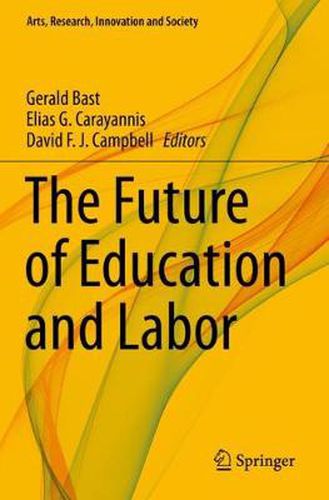Readings Newsletter
Become a Readings Member to make your shopping experience even easier.
Sign in or sign up for free!
You’re not far away from qualifying for FREE standard shipping within Australia
You’ve qualified for FREE standard shipping within Australia
The cart is loading…






This title is printed to order. This book may have been self-published. If so, we cannot guarantee the quality of the content. In the main most books will have gone through the editing process however some may not. We therefore suggest that you be aware of this before ordering this book. If in doubt check either the author or publisher’s details as we are unable to accept any returns unless they are faulty. Please contact us if you have any questions.
This book explores the ways in which education impacts labor markets. Specifically, the contributions in this book indicate that the future of labor is creative, socially aware and inter-disciplinary while identifying the changes and innovations needed in our educational systems to meet this demand.
Due to an increasing automatization (robotic manufacturing), the character of labor and work in general will change dramatically in the near future. This will be the case not only in the western countries, but also in the larger emerging economies in Asia, for example China and India. While societal environments, economy and the character of labor are increasingly in a process of dramatic changes, the educational systems and the leading principles of research about labor and employment are not changing adequately. Cross-disciplinary (inter-disciplinary and trans-disciplinary) thinking and learning is not the main focus of our educational systems. Consequently, the systems of academic research follow and apply disciplinary or even sub-disciplinary strategies, avoiding cross-disciplinary research approaches, and not supporting inter-disciplinary academic career models. This book introduces such strategic models to better prepare the next generation of workers for the new knowledge economy, and the future of democratic societies.
$9.00 standard shipping within Australia
FREE standard shipping within Australia for orders over $100.00
Express & International shipping calculated at checkout
This title is printed to order. This book may have been self-published. If so, we cannot guarantee the quality of the content. In the main most books will have gone through the editing process however some may not. We therefore suggest that you be aware of this before ordering this book. If in doubt check either the author or publisher’s details as we are unable to accept any returns unless they are faulty. Please contact us if you have any questions.
This book explores the ways in which education impacts labor markets. Specifically, the contributions in this book indicate that the future of labor is creative, socially aware and inter-disciplinary while identifying the changes and innovations needed in our educational systems to meet this demand.
Due to an increasing automatization (robotic manufacturing), the character of labor and work in general will change dramatically in the near future. This will be the case not only in the western countries, but also in the larger emerging economies in Asia, for example China and India. While societal environments, economy and the character of labor are increasingly in a process of dramatic changes, the educational systems and the leading principles of research about labor and employment are not changing adequately. Cross-disciplinary (inter-disciplinary and trans-disciplinary) thinking and learning is not the main focus of our educational systems. Consequently, the systems of academic research follow and apply disciplinary or even sub-disciplinary strategies, avoiding cross-disciplinary research approaches, and not supporting inter-disciplinary academic career models. This book introduces such strategic models to better prepare the next generation of workers for the new knowledge economy, and the future of democratic societies.